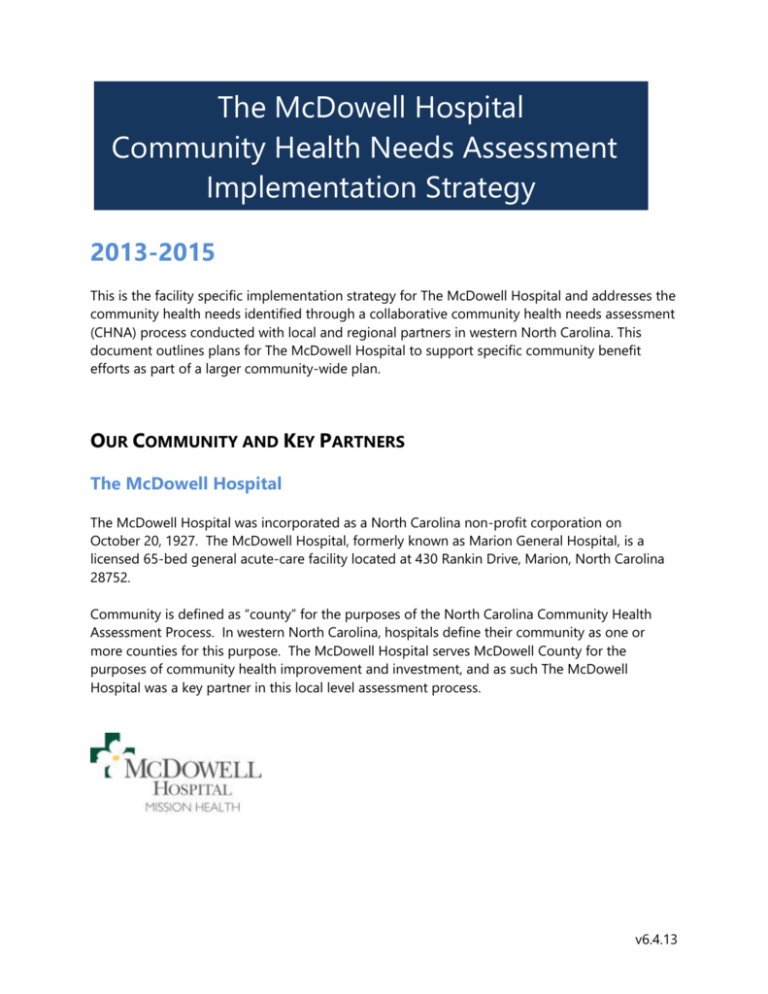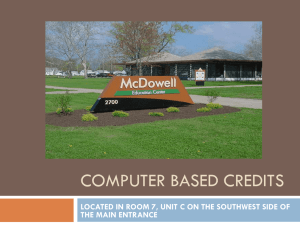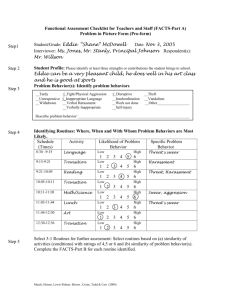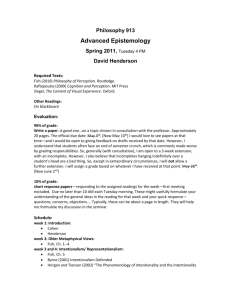Community Health Needs Assessment
advertisement

The McDowell Hospital Community Health Needs Assessment Implementation Strategy 2013-2015 This is the facility specific implementation strategy for The McDowell Hospital and addresses the community health needs identified through a collaborative community health needs assessment (CHNA) process conducted with local and regional partners in western North Carolina. This document outlines plans for The McDowell Hospital to support specific community benefit efforts as part of a larger community-wide plan. OUR COMMUNITY AND KEY PARTNERS The McDowell Hospital The McDowell Hospital was incorporated as a North Carolina non-profit corporation on October 20, 1927. The McDowell Hospital, formerly known as Marion General Hospital, is a licensed 65-bed general acute-care facility located at 430 Rankin Drive, Marion, North Carolina 28752. Community is defined as “county” for the purposes of the North Carolina Community Health Assessment Process. In western North Carolina, hospitals define their community as one or more counties for this purpose. The McDowell Hospital serves McDowell County for the purposes of community health improvement and investment, and as such The McDowell Hospital was a key partner in this local level assessment process. v6.4.13 Community Health Needs Assessment Process and Product The McDowell Hospital community health needs assessment (CHNA) was conducted in partnership with the Rutherford Polk McDowell District Health Department, McDowell County Health Coalition and WNC Healthy Impact, and other non-profit community organizations. This written report describes: The community served by the hospital Community demographics Existing health resources in the community available to respond to needs How data was collected in the assessment process The priority health needs of the community Health needs and issues of uninsured, low-income, and minority groups The process for identifying and prioritizing community needs and services to meet the needs The process for consulting with persons representing the community’s interests Information gaps that limit the hospital facility’s ability to assess the community’s health needs Sharing of Results Detailed findings for our assessment are posted on The McDowell Hospital’s website www.mcdowellhospital.org. The CHNA was presented to the McDowell Hospital Executive Committee on August 26, 2013 for discussion and to the Board of Trustees on September 24, 2013 for approval. Documentation of this board approval is available in The McDowell Hospital Board of Trustees minutes from September 24, 2013. Regional Partnership Our hospital’s collaborative community health improvement effort is also supported by a larger partnership with other hospital facilities and health department partners across a sixteen county region in western North Carolina to improve community health: WNC Healthy Impact. More information about this innovative regional collaboration, county-wide community health assessments, and overall regional findings, are made widely available to the public at www.WNCHealthyImpact.com. 2 PRIORITY HEALTH NEEDS & HOW THEY WERE ESTABLISHED Prioritization Process A Health Summit was held in September 2012 and community members were encouraged to help the Coalition Officers choose winnable strategies for creating Health Improvement Plans. choose data driven priorities in December 2012. Attendees were given the opportunity to give input once again. health issue among residents and the availability of needed resources to make measurable improvements. As part of the collaborative health assessment process in our community, specific health needs were prioritized based on the data that was collected, community input, and various factors related to feasibility of addressing the need. In North Carolina, community-level prioritization is a required part of the community health (needs) assessment process. Priority Health Needs for Our Community McDowell County In McDowell County local priority setting process described above, the following health issues were prioritized for collective community-wide action for 2012 – 2016. 1. Decrease the number of teen pregnancies - The state of North Carolina has the 14th highest teen pregnancy rate in the United States, with underserved rural counties typically having higher rates than urban counties. The Healthy People 2020 target is 36.2 while the 2010 teen pregnancy rate was 59.2 in McDowell County, 46.3 in WNC, and 49.7 in NC. In 2010, there were 77 babies born to teen mothers in McDowell County (up from 67 in 2009), consequently ranking our county 30th in the state for teen pregnancy. 2. Decrease tobacco use to reduce incidence of lung cancer – Tobacco use is the single most preventable cause of death and disease in the United States. Each year, approximately 443,000 Americans die from tobacco-related illnesses. For every person who dies from tobacco use, 20 more people suffer with at least one serious tobaccorelated illness. From this data it appears that lung cancer incidence in McDowell County, which was higher than both the mean WNC and NC rates throughout the period cited, increased 21.9% (from 76.2 to 92.9) between 1999-2003 and 2005-2009. 3 3. Reduce diabetes by promoting healthy eating and active living – Heart disease was the second leading cause of death in McDowell County in the 2006-2010 aggregate period. Further subdivision of heart disease mortality data reveals a striking gender disparity. From these data it is clear that McDowell County males have had a higher heart disease mortality rate than females for the past decade, with the difference as high as 81%. Regular physical activity can improve the health and quality of life of Americans of all ages, regardless of the presence of a chronic disease or disability. Among adults and older adults, physical activity can lower the risk of: early death; coronary heart disease; stroke; high blood pressure; type 2 diabetes; breast and colon cancer; falls; and depression. 4. Reduce substance abuse – Substance abuse refers to a set of related conditions associated with the consumption of mind- and behavior-altering substances that have negative behavioral and health outcomes. The listening sessions conducted by the McDowell Health Coalition highlight the importance of increasing prevention efforts and improving access to treatment for substance abuse and co-occurring disorders. Substance abuse has a major impact on individuals, families, and communities. The effects of substance abuse are cumulative, significantly contributing to costly social, physical, mental, and public health problems (DHHS, 2010). 5. Increase the number of residents who have access to affordable health care for themselves and their families - Access to comprehensive, quality health care services is important for the achievement of health equity and for increasing the quality of a healthy life for everyone. It impacts: overall physical, social, and mental health status; prevention of disease and disability; detection and treatment of health conditions; quality of life; preventable death; and life expectancy. HOW THIS IMPLEMENTATION STRATEGY WAS DEVELOPED Engagement in a Community-Wide Plan As a next step following the development of a community health needs assessment (CHNA), which includes prioritization of health needs, The McDowell Hospital collaborated with local public health experts and other key community stakeholders to develop a written description of the activities that hospital facilities, public health agencies, and other local organizations plan to undertake collectively to address specific health needs in our community. This collaborative action planning process resulted in the development of a community health improvement plan (CHIP) for each county in our hospital facility’s defined community, which includes McDowell County. . 4 Priority Health Issue #1: Teen Pregnancy Prevention Description of Community Need In 2010, there were 77 babies born to teen mothers in McDowell County (up from 67 in 2009), consequently ranking our county 30th in the state for teen pregnancy. Vision of Community-Wide Impact The goal is to reduce the number of teen pregnancies in our county. Teen pregnancy and childbearing bring substantial social and economic costs through immediate and long-term impacts on teen parents and their children. Partner Agencies and Roles Rutherford Polk McDowell Health District leads this initiative. Partnering agencies include McDowell Hospital, McDowell Health Coalition, Mission Health System, and McDowell OB/GYN. Related Hospital Strategy An action team to address teen pregnancy is organized through the McDowell Health Coalition. Hospital members on this task force are Kathy Hefner, Director of Patient Care and Michele Woods, Manager McDowell Birthing Center. McDowell Health Coalition - Parenting education classes centered on teaching parents how to speak to their children about sex. Program is also set to be presented to the Hispanic community. Priority Health Issue #2: Tobacco Use Description of Community Need WNC Healthy Impact Survey of current smokers in McDowell County was 21.6%. Tobacco use is the single most preventable cause of death and disease in the United States. Approximately 443,000 Americans die from tobacco-related illnesses each year, and for every person who dies from tobacco use, 20 more people suffer with at least one serious tobacco related illness. Lung cancer is a significant cause of mortality in McDowell County. The trend of development of new lung cancer cases in McDowell County over time was examined. From the data collected, it appears that lung cancer incidence in McDowell County increased 21.9% between 1999-2003 and 2005-2009. Vision of Community-Wide Impact Reduce use of tobacco products in the hospital’s service area through smoke-free environments, and health promoting interventions in medical and community settings such as schools and worksites. 5 Partner Agencies and Roles The McDowell Hospital leads this initiative providing smoking cessation classes at McDowell High School and Early College of McDowell Technical Community College. Ongoing we are offering smoking cessation classes to industry. Other partnering agencies include McDowell Health Coalition, and Rutherford Polk McDowell Health District. Mary Smith leads a Tobacco Action Team with the Community Transformation Program. Mission Health provides updated education in order for us to meet the needs of our community. Related Hospital Strategy Smoking Cessation Classes – Kim Freeman, Certified Smoking Cessation Educator – Classes are offered to industry and schools in groups or one on one. McDowell Health Coalition - Active Living – Primary doctors to write scripts for people needing more exercise to walk the Greenway Trails. Priority Health Issue #3: Healthy Eating and Active Living – Diabetes Reduction Description of Community Need According to the recent Community Health Assessment, diabetes is the 6th leading cause of death in McDowell County. In an effort to reduce diabetes, McDowell County’s approach is comprehensive. McDowell County residents can benefit from lifestyle changes to include healthy eating and active living. Vision of Community-Wide Impact Reduce diabetes through a comprehensive approach – Make the healthy choice the easy choice by improving access to physical activity and healthy food where we live, learn, work and play. Implement “Taking Control of Type 2” Diabetes Management to reduce diabetes through case management and education The McDowell Hospital will seek to collaborate with agencies, government, non-profit organizations and citizen groups to partner our services and programs to create the largest impact on the citizens in the county; educating and providing opportunities for healthy living behaviors and lifestyles. 6 Partner Agencies and Roles McDowell Health Coalition leads this initiative. McDowell Hospital is partnering with the process – “Taking Control of Type Two” Diabetes Management Program (Kimberly Freeman) Other participating agencies include Corpening YMCA, Kate B. Reynolds Healthy Places Grant, Marion Business Association Tailgate Market Manager, City of Marion Trails Association, City of Marion Planning Department, Rutherford Polk McDowell Health District, and the Local Branch of NC Cooperative Extension. Mission Health supports education by helping McDowell maintain its diabetes certification. Related Hospital Strategy Increase physical activity opportunities in the built environment (Greenways) to reduce diabetes through increasing opportunities to be physically active. Install market manager and EBT System at Marion Tailgate Market to reduce and prevent diabetes among low-income by increasing consumption of fresh produce through use of EBT at Farmers market. Implement “Taking Control of Type Two” Diabetes Management Program to reduce diabetes through case management and education Continue to offer education to our community and stay updated by way of Mission Health Priority Health Issue #4: Substance Abuse & Behavioral Health Description of Community Need Substance abuse refers to a set of related conditions associated with the consumption of mindand behavior-altering substances that have negative behavioral and health outcomes. The listening sessions conducted by the McDowell Health Coalition highlight the importance of increasing prevention efforts and improving access to treatment for substance abuse and cooccurring disorders. Substance abuse has a major impact on individuals, families, and communities. The effects of substance abuse are cumulative, significantly contributing to costly social, physical, mental, and public health problems (DHHS, 2010). Vision of Community-Wide Impact Reduce substance abuse in McDowell County Partner Agencies and Roles We are working with Mission Health for both adult and pediatric mental health needs that come into the Emergency Department and various other strategies involving mental health. Other participating agencies include McDowell Health Coalition, McDowell Healthcare Foundation, McDowell County Sheriff’s Department, Marion City Police Department, and Smoky Mountain Center. 7 Related Hospital Strategy McDowell Hospital is collaborating with Mission Health and the Telehealth Department to ensure that Telepsych is available for Pediatric patients in McDowell County. Adult telepsych is also offered in our Emergency Department in collaboration with Mission Heath. McDowell County Health Coalition – Pill Drop, promoting the permanent pill drop box at the McDowell County Sheriff’s Department, and supporting Project Lazarus. Drug 101 also developed for presentation for non-law enforcement. Major renovation in the Emergency Department to better serve mental health patients. Working with the County to support a Crisis Mental Health Center. Priority Health Issue #5: Increased Access to Care – Part 1 Description of Community Need Access to comprehensive, quality health care services is important for the achievement of health equity and for increasing the quality of a healthy life for everyone. It impacts: overall physical, social, and mental health status; prevention of disease and disability; detection and treatment of health conditions; quality of life; preventable death; and life expectancy. In 2011, 22.% of McDowell County residents was indicated as uninsured. Vision of Community-wide Impact Goal is to reduce the number of uninsured adults between 18 and 64 years of age by 1% per year for 3 years. Partner Agencies and Roles The Department of Social Services leads with collaboration from The McDowell Hospital and Health Plus Rural Health Clinic. Supporting agencies include Good Samaritan Clinic and the Rutherford Polk McDowell Health District. Staff time is provided by the Department of Social Services and the Good Samaritan Clinic. A Resource Navigator is provided by The McDowell Hospital. Related Hospital Strategy 1. Simplify the eligibility and enrollment process for public insurance program. By December 2015 inform additional people about the availability of public and private insurance programs: a. Identify uninsured people and assisting with health insurance enrollment to increase enrollment in insurance programs b. Actively promote new health insurance options by increasing awareness of insurance programs by December 2014 c. Support people enroll by informing clients about ways to enroll in permanent insurance programs by December 2015 8 Priority Health Issue #5: Increased Access to Care – Part 2 Description of Community Need Same as Part 1 Vision of Community-wide Impact Goal is to increase access to care for the uninsured and low-income. Partner Agencies and Roles The McDowell Hospital is lead providing staff time of Resource Navigator. Collaborating agencies providing staff time include Centro Unido Latino Americano, Rutherford Polk McDowell Health District, and Community Care of WNC. Supporting agencies include McDowell Health Coalition and Good Samaritan Clinic. McDowell Health Coalition – In process of completing grant proposal for the McDowell Access to Care and Health (MATCH) Program. The program is designed to aid those frequenting locations of free service and providing them assistance and resources to improve their ability to gain healthcare access, but also educate them on methods to be proactive on their health to prevent emergent issues. Related Hospital Strategy 1. Increase access to care, disease prevention programs, services and screenings especially among high risk and low-wealth people. By increasing access to Primary Care Homes for uninsured people (December 2013, 2014, 2015): a. Gain referrals by getting patients enrolled in the Navigation program b. Increase enrollment by enrolling eligible clients c. Increase awareness of eligible benefits so that clients gain benefits, if eligible d. Assist with applying for permanent health insurance so that eligible clients receive information about applying for permanent health insurance. NEXT STEPS As part of the community health improvement process, The McDowell Hospital will continue to work with community partners in the implementation of our community health improvement plan (CHIP) based on the hospital strategies outlined in this document. The CHIP will be reviewed annually to assess progress on key community indicators and updates will be made publically available in a county-wide State of the County Health Report (SOTCH Report). The next community health needs assessment (CHNA) will be conducted in 2015. 9 APPROVAL Each year, The McDowell Hospital Board of Directors, which includes representatives from the business, health, non-profit and community areas of McDowell, Buncombe and Transylvania counties, reviews the community benefit report from the prior fiscal year and approves this implementation strategy for addressing priorities identified in the most recent community health needs assessment and additional community benefit plans. At this time, the community benefit budget for the coming fiscal year is also approved. The Community Health Needs Assessment (CHNA) was approved by The McDowell Hospital Board on September 24, 2013. Documentation of this board approval is available in The McDowell Hospital Board of Trustees minutes from September 24, 2013. 10







